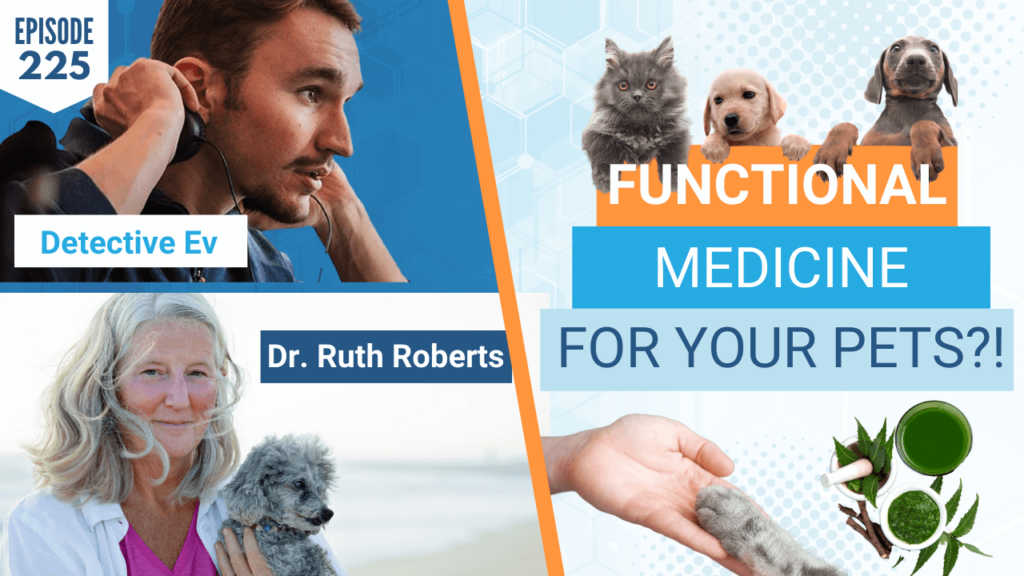Introduction
[00:00:00] Detective Ev: Welcome to the Health Detective Podcast by Functional Diagnostic Nutrition. My name is Evan Transue, aka Detective Ev. I will be your host for today’s show which is all about functional medicine for your pets. Let’s welcome our guest.
All right. Hello there, Dr. Roberts. Welcome to the Health Detective Podcast. How are you?
[00:00:04] Dr. Ruth Roberts: I’m well, Evan, how are you?
[00:00:06] Detective Ev: I can hardly remember a time I was better. Thank you for asking.
I heard that you did a fantastic job for us at the Health Space Unmasked event, and that’s why I tell you guys on the podcast to hop on. Most of the people that end up popping on are our practitioners. We don’t get a ton of traffic from the podcast to there. It’s like a whole separate audience sometimes.
But I’m telling you guys, there are really great events that we’re doing there. They’re longer than the podcasts, they’re more interactive. You can ask the person questions. And this was our most attended one, if I’m not mistaken. When you count the replays, like when people watched afterwards, it was the most attended one already and it just happened in early March.
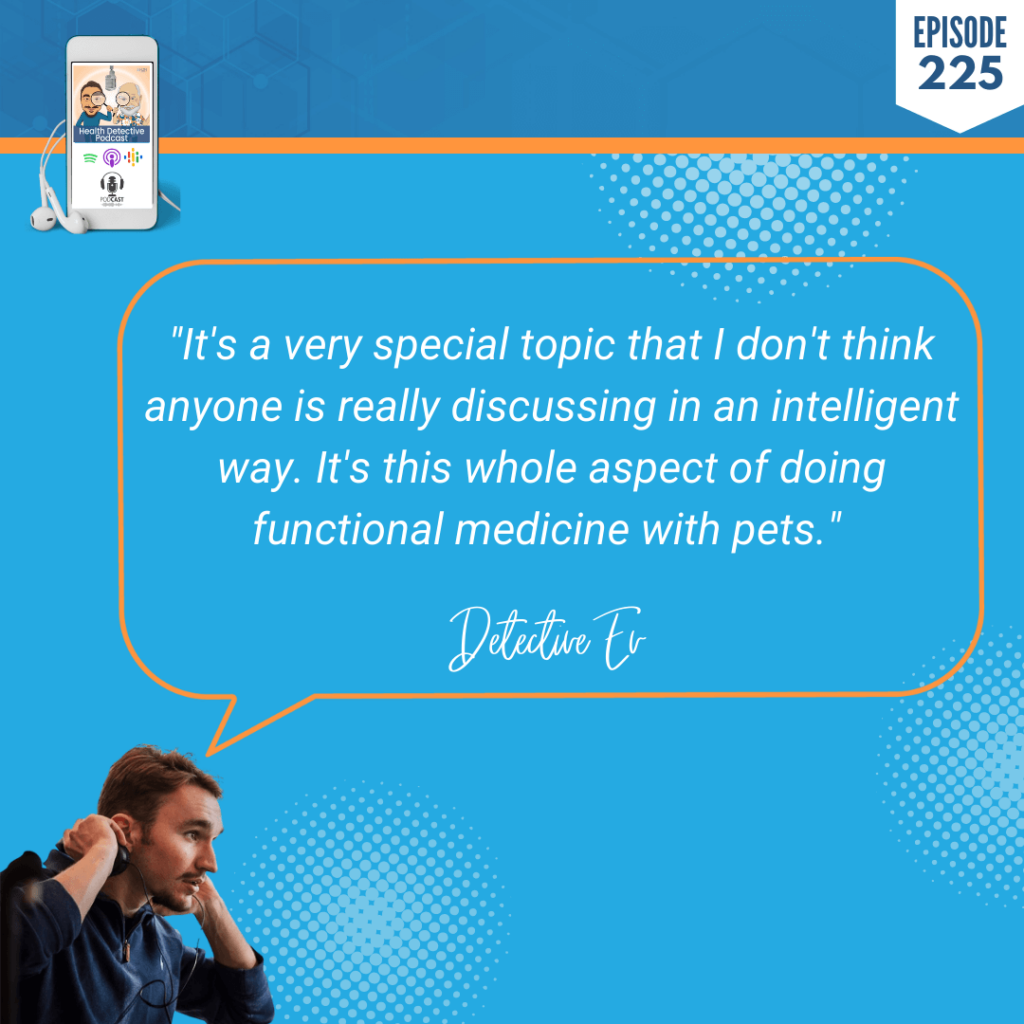
It makes sense too. It’s not only that Dr. Roberts is cool. It’s a very special topic that I don’t think anyone is really discussing in an intelligent way. It’s this whole aspect of doing functional medicine with pets. It’s happened to a few of our practitioners throughout the years. I know that they’ve ran some of our labs, believe it or not, on their animals. Yes, you can do that and I’m sure we’ll touch on that in some degree today.
Functional Medicine for Your Pets: Applying Learned Health Support to Pets
But I just want to get started with you real quick cause again, it is a separate audience, so we’ll not spend too much time on this. How did you get into this line of work? This is so specific; it’s already niche enough to get into functional medicine. Now we’re really pushing it by adding the animals in too. So how the heck did you get into this?
[00:01:21] Dr. Ruth Roberts: How do most alternative health practitioners get into alternative health? I got really sick. And I had a dog that was the love of my life, Arnold. He lived to be 17, his last six months were not pretty. I didn’t know what else to do for him. So, that was my promise to him as I euthanized him and wished him off into whatever is next in life or afterlife.
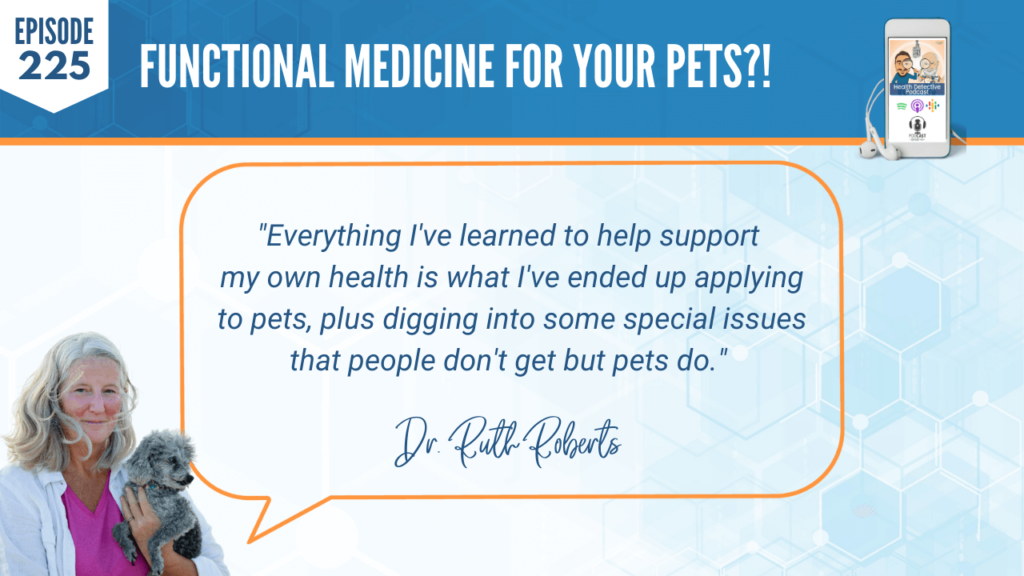
I promised him I would find a better way because what we have to offer in conventional medicine, whether it’s for pets or people. For people that are in a chronic disease situation at the end of their life, is extremely limited. What we have to offer them to actually help them feel better is even more limited. That’s been just my driving force is what could I have done more to help Arnold. Everything I’ve learned to help support my own health is what I’ve ended up applying to pets, plus digging into some special issues that people don’t get but pets do.
Functional Medicine for Your Pets: How Long Does It Take to Get Sick?
[00:02:27] Detective Ev: Got it. Yeah, that makes total sense cause everyone that shows up on this show that is helping other humans, they’ve all been through the ringer. I literally get maybe one person every three months on this podcast that actually has not really been through any major health challenges, but just chose to do it, which is very special and cool in its own right.
I’m curious if I may ask, what were you dealing with? It sounds like, like you said, you had personal health issues, correct?
[00:02:49] Dr. Ruth Roberts: Oh, yeah. This is back in 2005, 2006, I was eating the standard American diet. I was probably 80 pounds more than I am right now. I had IBS, fibromyalgia, four blown cervical discs, and I was not a very happy person. I was working ridiculous hours, working 80 to 120 hours a week easily. The caseload I was dealing with was extremely heavy. I was euthanizing five to seven pets every day. That takes a huge emotional toll.
So, I was really lucky in 2006 to find an MD that was doing functional medicine in Charleston, South Carolina. I didn’t like the answers he had. I’m like, well, how long is it going to take me to feel better? He was like, at least six months. I’m like, but I want the pill to make me better right now.

So, he asked me the question that we all ask our folks we’re supporting, and how long did it take you to get sick? Three years. Yeah. So, there you go.
Functional Medicine for Your Pets: From Lovely People to Junkies
[00:03:48] Detective Ev: Well, and yeah, that’s actually kind of decent, even in our world. Like sometimes, I mean myself, it was 14 years of dealing with symptoms almost before it even dawned on me. Oh, maybe it’s something lifestyle wise, cause this started for me super young. You’re truly just subject to whatever paradigm the adults in your life may have had.
My parents are awesome people, but they’re individuals that were very, at the time, Western medicine focused. They wanted to get results just as bad as me. But you’re just not even thinking outside that box, most of us at that age, you’re just doing what the adults say.
One thing I want to home in on, because I’m always fascinated by how people come to these conclusions and make the initial jump, especially someone who came from this more conventional way of thinking, probably. What was the final straw that led to you going to a functional practitioner? Cause I know that you found them, but for a lot of people that’s something that they would completely dismiss.
And it’s sad, but I’ve seen people go to their grave still dismissing these individuals because they are so set that that can’t work. So, what opens your mind to, hey, maybe I gotta go do that?
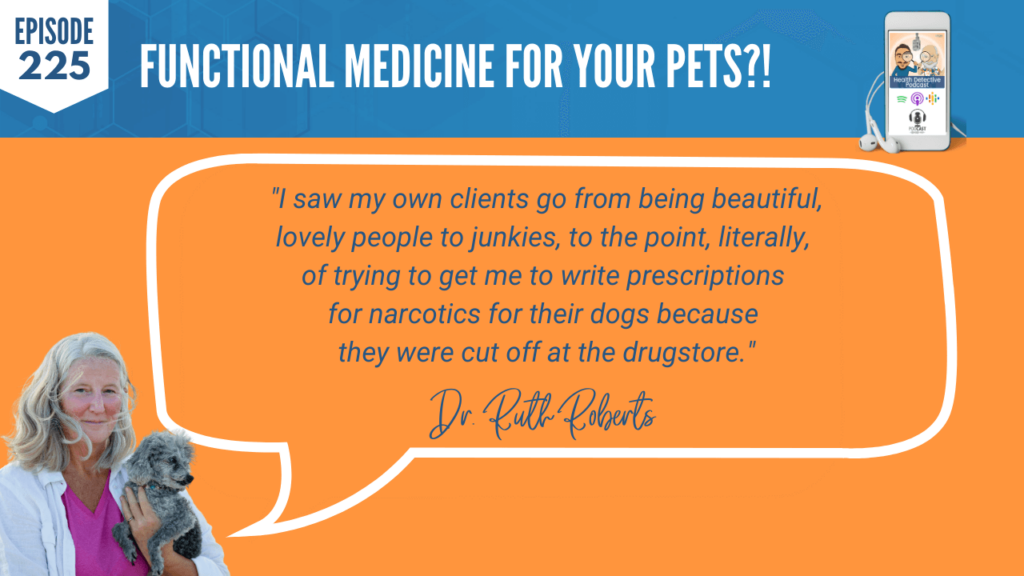
[00:04:45] Dr. Ruth Roberts: Well, with fibromyalgia at that point, the paradigm in conventional medicine is non-steroidal anti-inflammatories. When that’s not enough, then we’ll add in some narcotics and some more narcotics and some more narcotics. I saw my own clients go from being beautiful, lovely people to junkies, to the point, literally, of trying to get me to write prescriptions for narcotics for their dogs because they were cut off at the drugstore.
Functional Medicine for Your Pets: Realistic Expectations
So, with fibromyalgia, I knew that that was not the path to follow. That’s what made me start looking. At this point, I had already enrolled in traditional Chinese veterinary medicine training, acupuncture, and herbal medicine at the Chi Institute. It’s like I made the promise to Arnold, and I made me keep the promise for myself as well.
[00:05:35] Detective Ev: All right, awesome. Well, I’m glad that you eventually, obviously, got a lot better. You seem to be doing great now. You said 80 pounds, I wouldn’t even know that. Did it take the six months, or did it take longer or less time to get better?
[00:05:46] Dr. Ruth Roberts: It took six months to feel decent. What I thought was normal three years prior was actually decent. And it took another year to feel good.

[00:05:56] Detective Ev: Fair enough. I think this is worth mentioning to people because if you want to get better naturally and even functionally, whatever you want to call it, it’s possible. But you gotta understand that we’re healing the body, right? If the body healed overnight, we wouldn’t be having the health issues that we have, right? It’d be pretty simple to fix this stuff. So, give it some time, have realistic expectations.
Yes, the needle should be moving for you, you know? I would even say as this stuff gets more and more advanced, because now there’s a lot more effort being put into this whole space than there was back in 2006, you probably can feel a lot better even quicker. We have a lot of people that go through FDN type programs, and they feel better in a few months, but it’s going to be more than a day. It’s not the pill.
Functional Medicine for Your Pets: You Can’t Out-Pill a Bad Diet
The benefit of that is it’s more permanent, right? You don’t just stop eating this way and then all of a sudden go back to square one. You can kind of heal and then get some flexibility back in your life versus that pill. Maybe it makes you feel better at best in a day or two, but you take it away and then, oh, I got the same problems and a whole lot more than I had before, usually, right?
[00:06:50] Dr. Ruth Roberts: Right on. Yeah.
[00:06:52] Detective Ev: So, for Arnold, we did this, we figured this out, and obviously you hated seeing those last six months of his life. Seventeen is still actually really good for a dog.
What are some of the basic things that we can start with? Where are people messing up? Because like, I always know that people would be willing to do anything for their pets, usually, like generally speaking, more than they’re willing to do for their own health. Yet I see people feeding them this crazy dog food or treats with all kinds of chemicals in it.
So, where are just like the foundational things that people are messing up on that they don’t even think about when it comes to pet health?
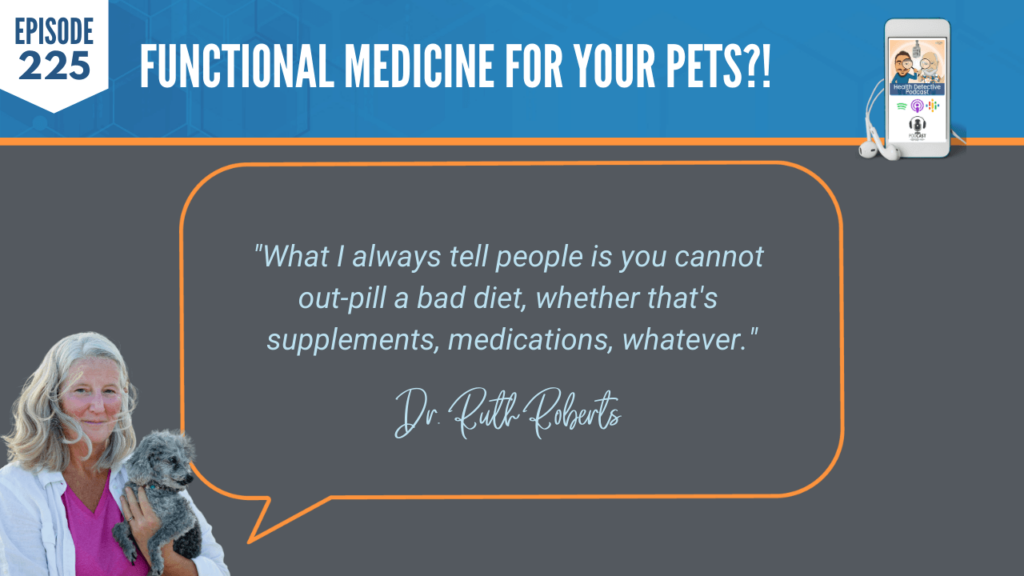
[00:07:23] Dr. Ruth Roberts: You hit the nail on the head. What I always tell people is you cannot out-pill a bad diet, whether that’s supplements, medications, whatever. If you’re feeding that pet junk, then you’re going to get that result.
Functional Medicine for Your Pets: The Originial CrockPet Diet
That’s where I started is with the original CrockPet Diet. That has been the mainstay. It is a cooked, whole food diet that you can manipulate based on what your dog or your cat needs. That is truly the foundation of health.

I mean, Socrates said this for a reason, “let food be thy medicine and thy medicine be food.” And that’s the truth. If we don’t start with what we’re eating, what we’re feeding our pets, then we’re not going to make significant progress. Sadly, there’s all these really expensive, high quality, human grade ingredient brands of food that are freeze dried, that are in some cases frozen and shipped fresh. Those are better, certainly, than the bag of Royal Canin or some sort of prescription veterinary diet. But there’s nothing that beats a home cooked meal.
So, if you think about it this way, we can get this beautiful, incredibly expensive freeze-dried food, but do you want to eat power bars for every meal? It’s like, yeah, you can do it and the astronauts can do it, but even they like to rehydrate at least their food. But that’s not what good nutrition is.
It’s food in its natural form that is cooked appropriately. And I’m saying “cooked” because most of my colleagues will tell you that raw is the only way. I’m going to tell you that that is not the only way. There is the way that is right for that pet. And then in my hands, for the vast majority of my clients and their pets, it’s been cooked food.
[00:09:10] Detective Ev: Okay. This is great.
Functional Medicine for Your Pets: Cooking Makes Nutrients More Available
The audience that listens regularly knows this. I like to go in with a healthy level of ignorance. What that means is I never not look up our guests, but I try to not go so in depth that I already know all the answers to stuff. So, this is actually genuine. What I try to do is, I want to put myself in the state that the audience will be in. I want to ask the questions that they will ask.
So, when you said, “cooked”, I appreciate you specifying that. Because my first thought that went through my head, I’m not a dog expert or animal expert, shouldn’t they be eating raw?
My little puppy, she can’t, whip out a pan and start cooking stuff up. But clearly, you’re the expert here and there’s more benefit to it. You said it might not be right for your dog. I don’t know if this is something that people can even figure out at home necessarily. But like, what is the advantage to a dog getting cooked food when, obviously, at the very least, it’s not something they could do naturally? So, what is the benefit to it?
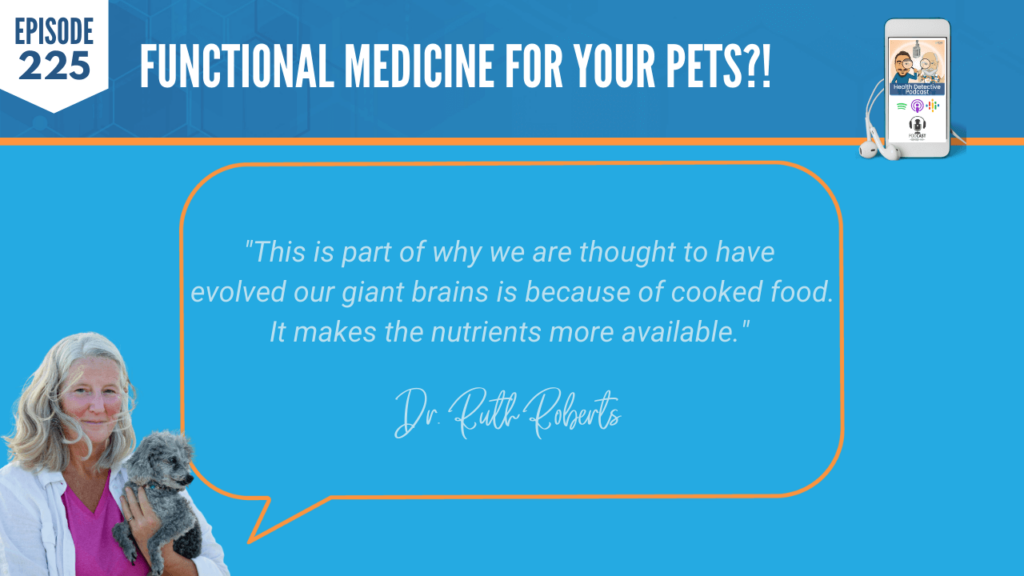
[00:09:59] Dr. Ruth Roberts: Well, think about where dogs came from. They split off from wolves about 40,000 years ago. We showed up around, homo sapiens showed up about 50,000 years ago. Neanderthals had already been cooking. This is part of why we are thought to have evolved our giant brains is because of cooked food. It makes the nutrients more available.
Functional Medicine for Your Pets: The History Behind Dog Food
So, same thing with dogs. They evolved eating our garbage first, what they could scavenge. You know, they’re indiscriminate omnivores and they will eat anything that’s available to them. They would scavenge food and then what we fed them, you know, our leftovers. Like, well, throw the dog the bone or whatever, the grain or the bread that we’ve cooked, started cooking, baking 30,000 years ago.

Then finally the last step is what we actually fed them. And until the 1950s, the bag of food was for ultra wealthy people with hunting dogs. So, this whole concept of feeding a nutritionally balanced diet in every bite is just a marketing promotion.
Many of my colleagues will say, but oh, raw is the ancestral diet of dogs, and that is true, but for wolves and the progenitor species before them. It’s also our ancestral diet for pro progenitor species prior to homo Neanderthals. So, that’s kind of it.
[00:11:25] Detective Ev: Fair enough. That’s actually the first time I’ve heard that. That’s really cool.
My one friend is a dog trainer, and even still to this day, they’ve experimented with a million different things, right? They don’t have one specific answer, but regardless, he always buys super high-quality stuff.
I know they actually, I think, even presently go back and forth. It’s a Dobermann, so sometimes the dog gets this raw food and then other times it gets cooked. But it’s like a huge prescription, right? They know exactly what things to put in for them. I don’t know if they’re necessarily doing it in the same way that you would.
Functional Medicine for Your Pets: Grains or No Grains?
Because again, they’re trying to, it’s kind of like body building humans, right? We wouldn’t necessarily call building humans to be the perfect diet, but that’s what they’re kinda doing for the dog. It’s like something that’ll buff it up and make it super athletic. So, this is interesting.
I consider myself fairly educated in health, but not the animal side. My initial thought is the animal is supposed to be eating raw. But this makes total sense, cause yeah, they kind of evolved with us.
I can never really picture my family’s dogs. We have a Shichon at our house and then we have a Chesapeake Bay retriever here. She’s like 16 pounds, cute as can be. I can’t picture her going out and like ripping up an animal and eating that raw. She’s so domesticated that obviously she does need different foods. Like she kind of moved along with us here.
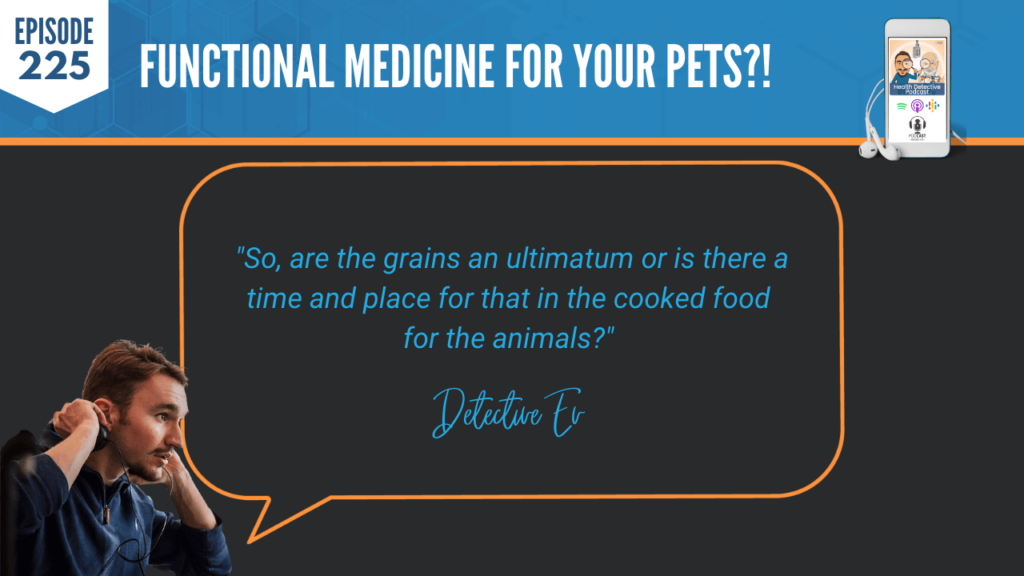
I hope this isn’t too simple of a question for you, but what do you think about the whole grain thing? Because I’ve heard this argued back and forth a lot of times. I did take the risk and our family dog has eaten grain free pretty much her entire life. She is, unbelievably healthy. I mean, she’s 11 years old, Shichon, like I said. Jumps off the couch that’s four feet high, sprints up the stairs, chases deer. I mean, she’s never had a health issue yet. I don’t know if it’s just the food or other things that we’ve done, but that seemed to have gone well. So, are the grains an ultimatum or is there a time and place for that in the cooked food for the animals?
Functional Medicine for Your Pets: Make Balanced, Rational Decisions
[00:13:01] Dr. Ruth Roberts: There’s no ultimatum on anything.
In the United States of America, we’re like, oh, coconut oil is bad for you in the seventies, right? So, they pulled all that stuff out. Like, that’s what used to be the butter for movie theater popcorn and so delicious, right? Now, 30, 40, 50 years later, coconut oil cures everything. The truth is somewhere in between. It’s great for some things; it’s not so great for other things.
It will increase your LDL cholesterol level if you eat a ton of it. And there’s starting to be some evidence that yes, that goes up with keto diets, but maybe that’s not such a good thing. So, grains, if you can tolerate them and they nurture you, yes, eat them. If you can’t tolerate them and they make you sick, don’t eat them.
Same thing with legumes, which is what ends up going into grain-free diets as a carbohydrate source. Beans are wonderful, they’re nutritious. However, if your GI tract cannot tolerate them, you probably shouldn’t eat them. What happened with the whole grain-free food debacle is that 65% to 70% of the calories of those foods are beans. And beans do contain anti-nutrients called lectins and phytates. Even cooking them thoroughly, if you’re eating that many beans, that’s probably going to create some issues.

That’s part of the problem about how we see food in the United States. It’s good for us or bad for us. Then we eat like, oh, blueberries are good for us. I eat two cups every day. I mean, let’s make it more balanced and complete and be a little more rational about how we approach food.
Functional Medicine for Your Pets: What’s Working or Not Working?
[00:14:49] Detective Ev: Yeah. You’re like one step ahead of me. I feel like anything I’m thinking you’re already answering for me. I was thinking about this as you said it. I’m like, duh, Ev. If someone asked me, are grains bad for humans? My answer would be, well, I actually do terribly on grains, but other people I know do just fine. Why would it not be the same for dogs when we have so much diversity amongst them? That makes total sense.
Yes, some dogs might do a lot better with just more meat. Some dogs might be able to handle a little bit of everything. So, okay. I feel like yeah, I need to not make special rules. They’re still animals just like us. They’re going to have different conditions and different circumstances.
[00:15:22] Dr. Ruth Roberts: Exactly. Like, keto is a big thing. I’ve eaten keto for years off and on, for health reasons. But if you look at a lot of the products that are designed for keto, for snacks, it’s got a bunch of garbage in it. You just have to think, what’s working, what’s not working.
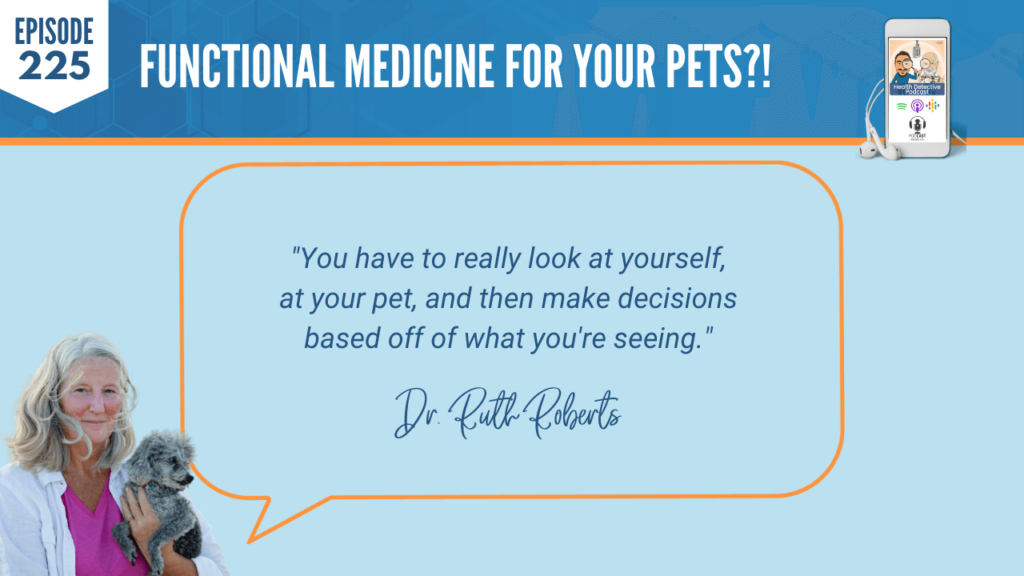
Is the raw diet working for my dog? Fantastic. Ooh. When he eats cooked food, it’s not so good. That happens sometimes. But most of the time raw food’s not really working for my dog. His stool is always soft. Wow. Amazing. On cooked food with more fiber, he’s doing great. So, you have to really look at yourself, at your pet, and then make decisions based off of what you’re seeing. It’s not an overnight like, yes, this is the way. You may see in two weeks or 30 days that it’s not quite the way and you have to make some modifications.
Functional Medicine for Your Pets: Environmental Toxins
[00:16:11] Detective Ev: Got it. Guys, so just like, I mean, as the podcast implies, just like we need to be these health detectives for ourselves, we can be health detectives for our pets. In fact, we’re obligated to, cause they don’t have that ability to do that in the same way we do. If we’re going to have them as part of our family, I think that’s kind of one thing that we owe them.
So, diet’s an obvious one. Even if they don’t know the answer, which I didn’t, if I went out and asked anyone where is like one place we’re maybe messing up with our pets? They would all say, okay, well maybe diet. Are there other things that we’re messing up on that might not be so obvious? I’m already thinking like, what about their sleep cycle compared to ours and all these things. Is there another one that is kind of a huge thing that’s affecting them?
[00:16:47] Dr. Ruth Roberts: Yeah. I mean, the next big category, frankly, is environmental toxins.

Think about it this way. If you’ve got the dog you mentioned earlier, the little guy that’s like 16 to 20 pounds or like our little dog, HiO, she’s six pounds, they’re much lower to the ground. So there is dust and stuff falling from the air onto the ground. All of that dust is laden with a chemical soup that we really don’t want to think about on a daily basis, or we might be immobilized. But these guys are snuffling it up from the carpet; they’re licking their feet and ingesting those chemicals.
Functional Medicine for Your Pets: Aid the Detox Process
The other part is that we are also applying pesticides to them or giving them a pill every month or every three months that contains pesticides to keep fleas and all of this other stuff off of them. I practiced in South Carolina, sometimes you need some help with flee control. But the point is, their overall environmental toxin load is astronomically higher than ours is. In fact, in cats, their toxin levels are 96% higher than humans. You can check that out on Environmental Working Group. And in dogs, their toxin levels are 46% higher than humans. Their load is much greater.
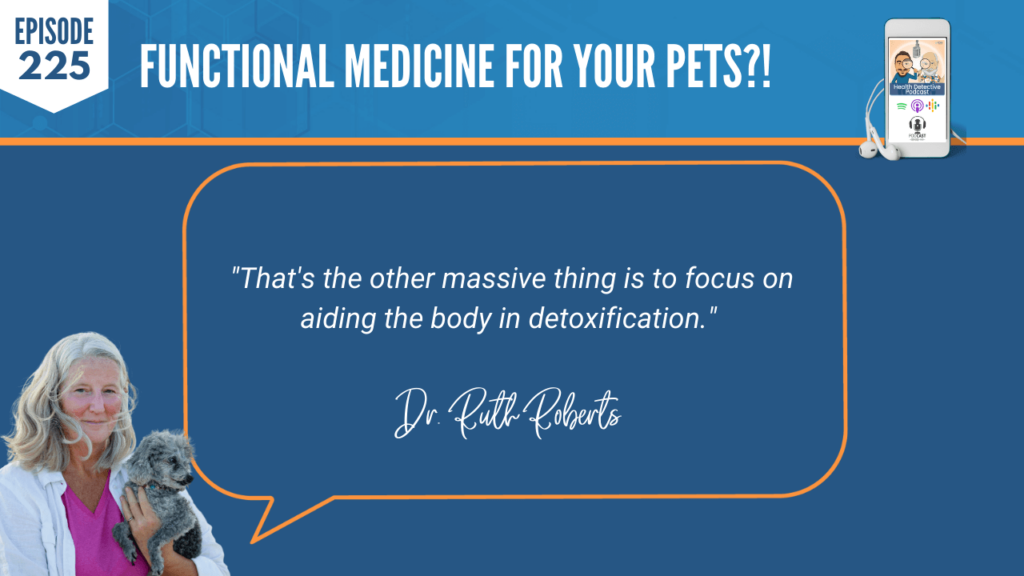
This is part of why, circling back to diet, helping nurture the microbiome is incredibly important. Helping to support the liver so that can efficiently and effectively get rid of these toxins is incredibly important. That’s the other massive thing is to focus on aiding the body in detoxification.
[00:18:33] Detective Ev: I never even thought about that from a household perspective. I think as far as I’ve gotten was, I had my dad, thankfully he agreed because he has always been a traditional guy, he smokes cigarettes. He’s a great dad. He’s just in that kind of mindset for health.
He was spraying glyphosate everywhere, cause he’s a landscaper, all outside where our dog walks. And I’m like, dad, even if you’re not going to do it for us, it’s fine. But look at Macy, her face is in this where you just sprayed like two days ago. Like, she’s going to get this, and I know we love her. If nothing else, you don’t want mom on your case when Macy has to go to the vet. So, if nothing else do it for that. He thankfully stopped.
Functional Medicine for Your Pets: Choose Nontoxic Cleaning Products
But now I’m thinking like, oh my gosh, my mom is a total clean freak. I kind of inherited this. I just try to do it with better products, but I’m thinking about how spotless her floor is.
Then yeah, you’re right. Macy runs with her little paws on there, and sure enough she goes into the other room and she’s always chewing on her paw and stuff. So, I’m actually just super happy that Macy’s in the place that she is now, but I’m realizing, wow, not only does our dog probably have these extra toxins, but all these dogs do. That’s actually statistically backed by what you just said. That’s kind of crazy.

[00:19:34] Dr. Ruth Roberts: It is. It’s insane. That’s the thing, being a clean freak is actually fantastic because you’re removing this stuff but choosing your cleaning product is incredibly important. So, vinegar and water, I mean, is a perfect solution. It’s going to get rid of the garbage and leave no residue behind that’s potentially toxic.
[00:19:53] Detective Ev: Okay, cool. So, we got the food, we got environmental toxins. Then I actually want to touch on this one specifically. I’m not sure if it’s something that you get into a lot, but I am huge on circadian biology. I’m fascinated by light and stuff. I do the whole, I’ve been doing it for years, the blocking the blue light at night. I’ve found that to be profound for my health. I get out and catch morning light every single day.
I’ve always wondered with dogs, like I know that they have different receptors, so it’s not probably identical to us.
Functional Medicine for Your Pets: Spaying and Neutering
I even understand that, if I’m not mistaken, some dogs would’ve been more like wolves. Aren’t they nocturnal to some degree, or am I completely wrong with that?
[00:20:25] Dr. Ruth Roberts: They do have nocturnal activity, but most of their hunting activity is during the day. Yeah. Then there’s coyotes that are definitely out there hunting at night. It’s kind a mixed bag. Cats are definitely nocturnal, for sure.
[00:20:37] Detective Ev: Okay. Either way, I’m wondering, if a family keeps their TV on all the time while they’re sleeping, all of us would know that that’s terrible. But I’m wondering about like their fluffy friend that’s sleeping at the end of the bed that’s also subject to that TV. Is that something that you’ve studied at all or what’s your opinion on that?
[00:20:54] Dr. Ruth Roberts: No, there’s clear evidence that EMFs, light pollution, all of that messes up everybody’s circadian rhythm, messes up their melatonin production, all of those things. That’s incredibly important. But I’m going to tell you that if we’re going to talk about the top 10 chunks, that’s down at the bottom of the list or close to it.
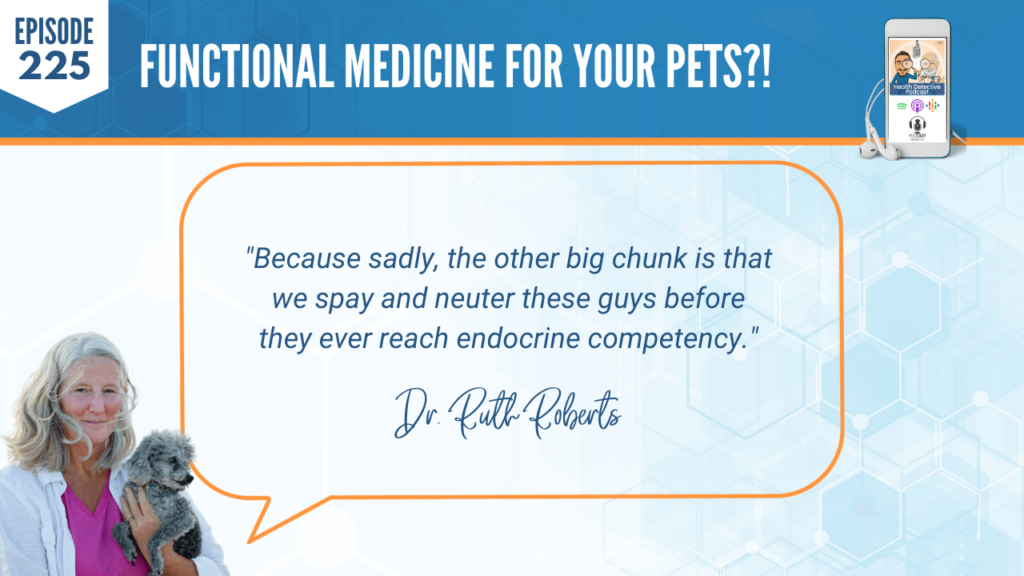
Because sadly, the other big chunk is that we spay and neuter these guys before they ever reach endocrine competency. It’s interesting, there’s a researcher at the University of Oregon at Corvallis, at the veterinary school that’s actually linked excess luteinizing hormone production in spade and neutered pets to creating receptors for luteinizing hormone on tissues that shouldn’t have them. They are the joints, the bones, the bone marrow, the adrenal glands, the brain, the gut, so, all of these places where we’re seeing chronic disease.
Functional Medicine for Your Pets: A Main Cause of Cancer
Her research is pointing to that as being one of the main causes of this epidemic of cancer we are seeing in our dogs and cats. That’s a huge problem.
Again, you can’t un-spay or un-neuter. Maybe somewhere in the future there will be some sort of hormone replacement. But what we can do, again, is support our pets to help clear excess levels of luteinizing hormone and just be cognizant that this is an issue. That is just fascinating research and horrifying at the same time.

I mean, we solved a problem of pet overpopulation, but unfortunately, in the meantime, we created a monster with it. Does that make sense?
[00:22:33] Detective Ev: Yeah, it does. I’m just trying to think. We only had Macy in my family, and it was never really my responsibility. We kind of got her as a teenager, mostly for my sister.
Now I love Macy to death, right? I would take out anything for her. But I just never really thought about that aspect. Then we have Jager here who was my girlfriend’s dog, and of course I love him now. I’ll put it this way, he’s fully intact. He’s a 90-pound dog, so you get to see it every day. It’s in your face kind of.
He’s by himself though, he’s not with other dogs. But he doesn’t seem to show anything negative from this. In fact, this is actually one of the sweetest dogs I’ve ever been with. Like he is not aggressive. He’s not mean.
This is so tough cause, I guess, it’s situational, but like, should we really be doing this to animals at all? Like should we be spaying and neutering?
Functional Medicine for Your Pets: Not a Society for Intact Pets
[00:23:12] Dr. Ruth Roberts: Well, this is a really a double-edged sword. It truly is. Tell me again how old Jager is?
Detective Ev: Jager’s four years old.
Dr. Ruth Roberts: Okay. So, he is a young guy. This is the thing is that I’m seeing dogs, Labradors, at five and six, dying of lymphoma. I mean, this is just crazy.
But back to your question, should we be doing it at all? Here’s the difficulty, in Europe, they really don’t, and they don’t have anywhere near the incidence of cancer that we have in our pets in the US. The difficulty is when I started practice in 1990, the local SBCA took in, I think 45,000 animals a year, and they euthanized more than 38,000. That’s a problem.
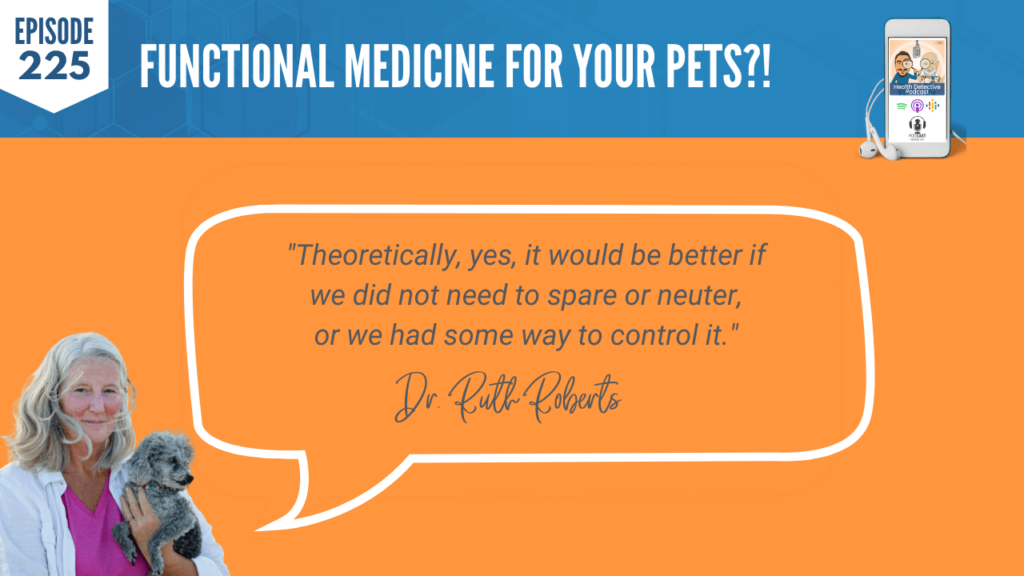
Theoretically, yes, it would be better if we did not need to spare or neuter, or we had some way to control it. But the reality is, is that US society is not set up for a society of intact pets. The other issues are things like daycare, boarding kennels. They can’t get insurance if they allow pets that are intact into their facilities. It’s kind of a tough one. Definitely a tough one.
[00:24:25] Detective Ev: I did not know that about the insurance either cause my buddy owns a whole thing and obviously we don’t talk about that side of his business. I just think it’s a crazy job and God bless him. Like I know you make great money, but there’s just certain things that aren’t worth it. You gotta really love what you do to be doing that.
Functional Medicine for Your Pets: Socializing Pets Properly
Let’s say hypothetically, I guess for most people this wouldn’t be realistic, but if your dog never had to go to daycare and you know that you’re only ever going to have like one dog at any given time, like my girlfriend is never going to add on another dog while Jager is alive. In that case, I mean, if they’re not interacting randomly with other dogs and they’re not going to daycare and you know that it’s just going to be at the house, it would probably be clearly better to keep them intact and let them do as nature intended.
[00:25:03] Dr. Ruth Roberts: Exactly. The other thing is, is that doesn’t mean that we can’t do something like a vasectomy, or an ovary sparing spay that would prevent them from reproducing and not have the pet overpopulation problem take off again.
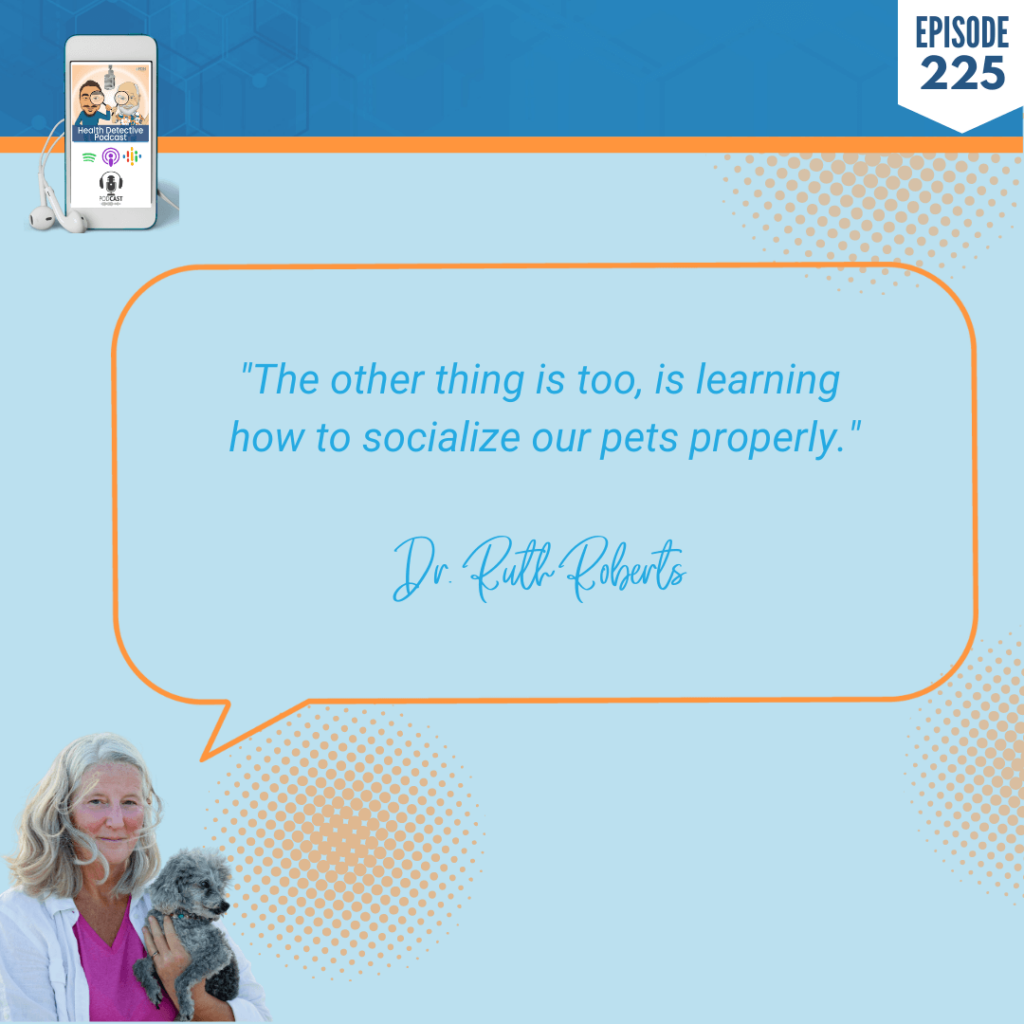
The other thing is too, is learning how to socialize our pets properly. We spend a lot of time in Mexico and there’s dogs running around on the beach. For most Americans, they’re like, oh my God. They’re going to…, but they’ve worked it out. They’ve learned how to socialize with each other and learned what appropriate behavior is and is not.
[00:25:37] Detective Ev: I agree with that because Macy, she’s good, but my parents live on like three and a half acres, not rural, but getting there. She doesn’t see other animals and she barely sees other humans. We usually go out, like when I lived with my parents, we usually went out because no one really wants to drive the 30 minutes to us. They’re all in town or the city or whatever.
Functional Medicine for Your Pets: Let’s Talk Action Steps
So, when Macy sees another human or dog, it’s a little embarrassing, right? But I got to see Jager with Maddy. I’m like, I can’t believe how well behaved this dog is. Whether it’s a fair stereotype or not, these are the ones that you’re worried about, right? It’s a big dog, and he’s intact on top of it so you’re expecting a problem. Yet Jager is like a thousand times better behaved than little Macy to be dead honest.
So yeah, training the animals right and socializing them properly, I think could go a long way.
[00:26:21] Dr. Ruth Roberts: Amen to that. It would solve a lot of problems for us too.
[00:26:26] Detective Ev: Yeah. Alright, now I want to spend like the last 20 minutes or so, not only just talking about what you offer, but talking about what are the steps then? Because I think everyone that is willing to listen to a podcast like this and listens to us in general, even if they didn’t have the answers, they already know that we’re doing stuff wrong with our dogs and animals.
I’m already thinking I’ve never really considered the environmental toxin thing outside of glyphosate. I need to go focus on that. I’ve never really even thought, not that it’s a little too late with Macy, but the whole spaying and neutering thing, I didn’t know that that could be contributing to the cancer.
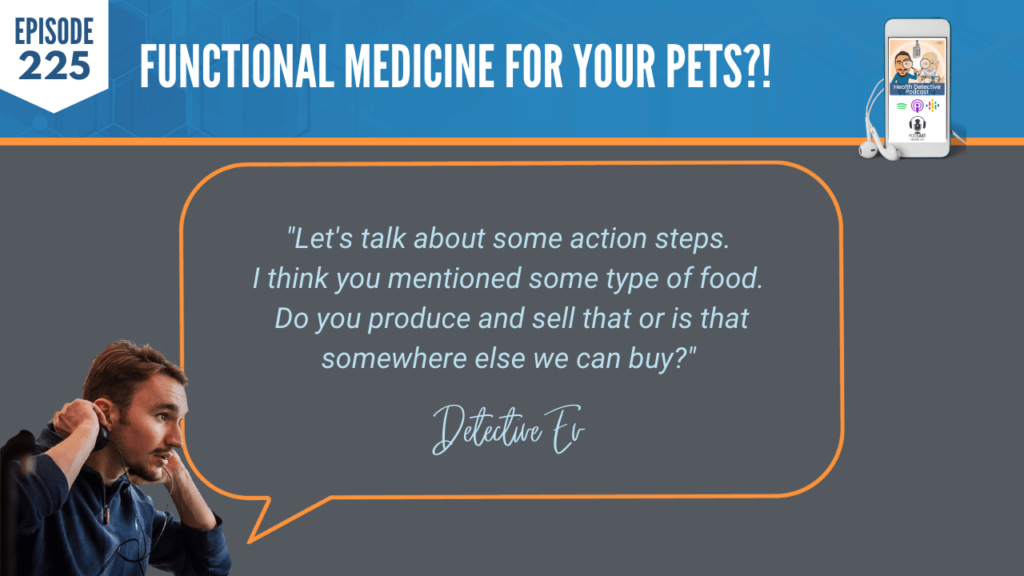
Let’s talk about some action steps. I think you mentioned some type of food. Do you produce and sell that or is that somewhere else we can buy?
[00:27:00] Dr. Ruth Roberts: No. That’s the whole thing.
Functional Medicine for Your Pets: Start Cooking for Fido
The original CrockPet Diet I developed back in 2006 just as the first pet food recall hit. It is a recipe of home cooked food, proteins, brassica vegetables, other veggies, grains and or beans based, and or some other starch based on what that individual pet can tolerate and then healthy fats.
There’s a course that we’ve got a great question and answer group every week to help you learn how to cook and how to modify the diet for your pet. Whether you do mine, whether you do Dr. Judy’s, whether you do somebody else’s recipe, start incorporating real food into your pet’s diet.
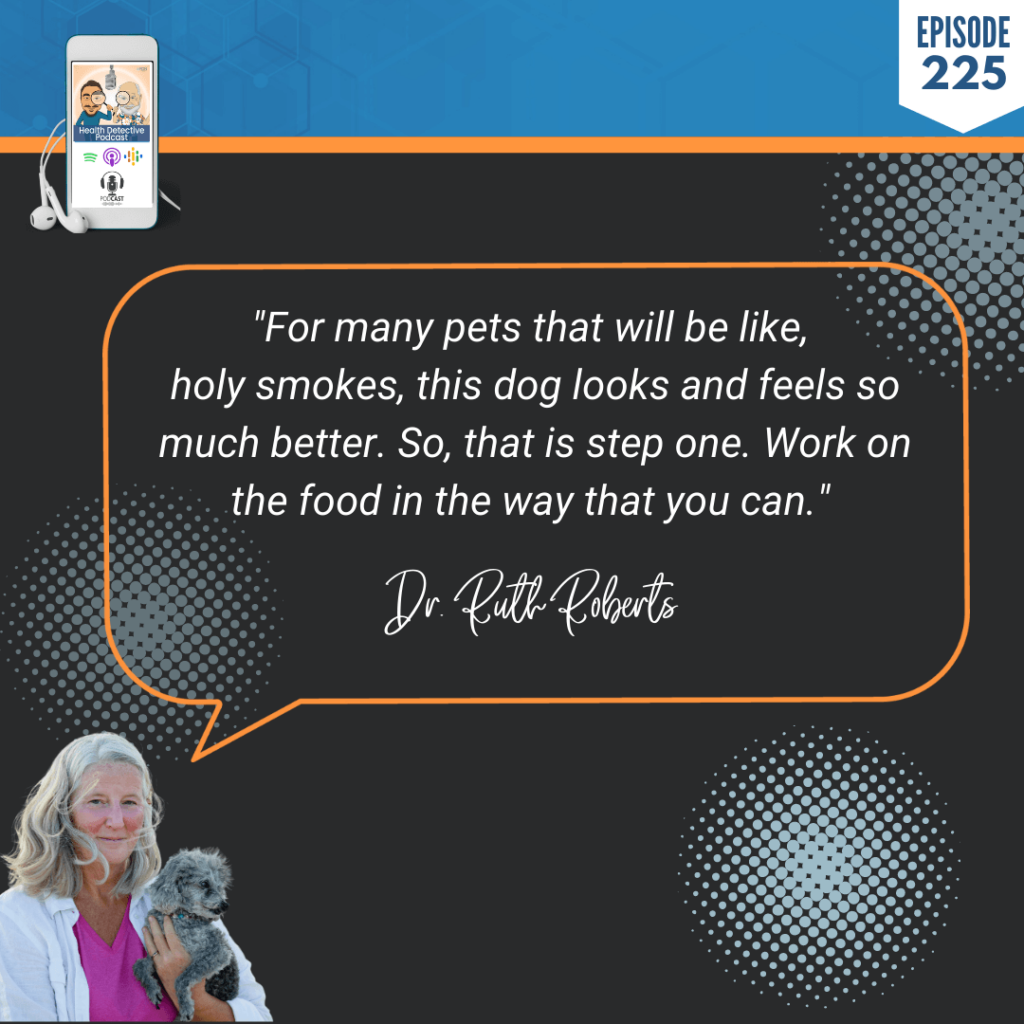
If all you can do to start with is go down to Costco and grab a giant bag of Normandy blend vegetables, which has got some broccoli, some cauliflower, and some squash in it, grab a handful, cook it up, throw it on top of the dry food. You’re making the first step. That is critically important. For many pets that will be like, holy smokes, this dog looks and feels so much better. So, that is step one. Work on the food in the way that you can. Once you get more confident and you start to see the changes, you’ll want to do better because it just is astonishing sometimes.
The second is to be cognizant of what products are in my home. I mean, do you have Mr. Clean under the sink? God knows what’s in Mr. Clean. He does a great job, but you know, why? So, be cognizant of that.
Functional Medicine for Your Pets: Keep My Pet Healthy Plan
Look at the shampoos, the products that you may be using on your pets. The flea prevention, the heartworm prevention, the flea pills.
This never made sense to me. Let’s give a dog an oral pesticide that’s going to work for 30 days, which means they have to eat it, absorb it into their fat, and then release it to the skin to kill the fleas. Just be super aware of what you’re doing and start to question, is this really in my pet’s best interest. Scale the things back that you can, look for natural options for heartworm prevention, if possible, for flea control. And talk with your veterinarian. You may not get much good feedback, but at least you’re going to know where they stand.
Vaccinations, it’s really clear, the literature was super clear in 1994, I think was the first paper Dr. Schultz published showing that the duration of immunity after a properly executed puppy or kitten series and a booster at roughly 16 to 18 months of age was at least three years and, in many cases, up to seven. So, ask your veterinarian four titers which is a blood sample, to see if they’re still protected against a particular core vaccine issue like distemper or parvo virus.
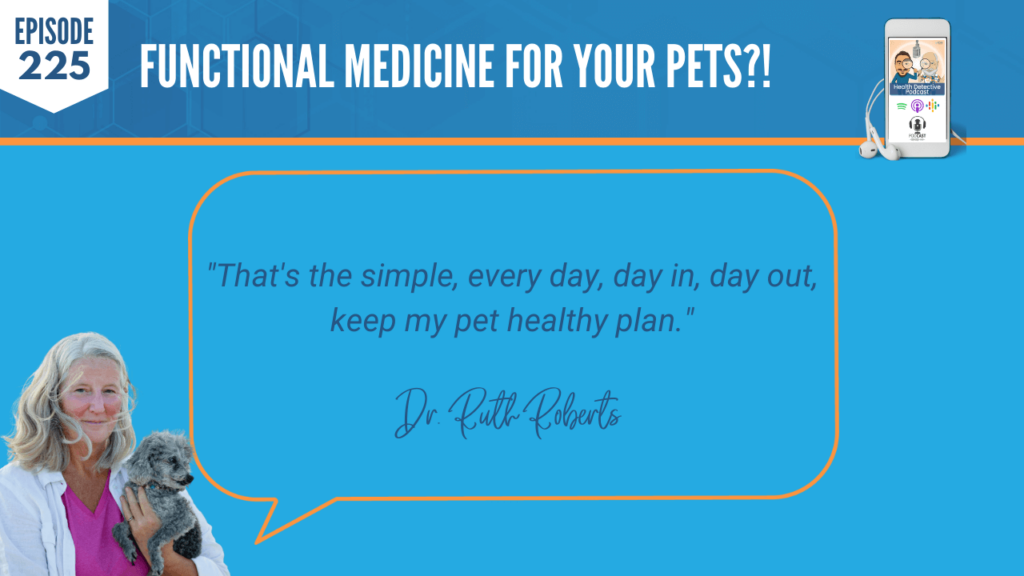
Then just from there, work on controlling inflammation, work on supporting detoxification, and that can be as simple as adding in omega-3 fatty acids, probiotics to help support the microbiome, and milk thistle to help the liver get rid of excess garbage. That’s the simple, every day, day in, day out, keep my pet healthy plan.
Functional Medicine for Your Pets: What About the Vaccines?
[00:30:15] Detective Ev: Nice. Well, and the good news is if you’re focused especially with the chemical side, if you’re focused on just bettering your own health in your own home, it seems like a lot of this would go fairly well together. Because if you’re cooking your own food, get something going for the puppy too. If you stop using toxic cleaners, you’re automatically helping them. That seems like it all works together kind of nicely.
[00:30:32] Dr. Ruth Roberts: Exactly. Yeah. I mean, we know our pets are our family. So, these are things that if we’re aware that they’re problems that we would do for our children, we’re just doing it for the four-leggers.

[00:30:43] Detective Ev: Actually, I had this written down, but we got so into it that I honestly forgot this one. I will preface this so that I don’t put you in a weird position. I’m curious, so what is your opinion about the current, if I may ask this, the vaccine schedule for the dogs?
And I hate that I even have to disclaim this, but of course the default is not to be reasonable in today’s world. So, just to be clear, guys, just because we are on a functional podcast does not mean this is an anti-vaccine thing at all. But I think most of us, when you’re in the functional space, the reasonable opinion for most people starts to be, it’s not, no vaccines; it’s like, okay, do we need to give the kids all of these? I think that’s a reasonable question.
Functional Medicine for Your Pets: Core, Non-Core, and Not Recommended
So, I have the same question for the dogs. I’m not saying that we shouldn’t do any ever. But are we giving too many? Because I’ve never had to give these vaccines to a dog. Like Maddy’s getting shots for Jager like every other few months sometimes for like ticks or this thing or that thing. Is that overdone, do you think?
[00:31:30] Dr. Ruth Roberts: Yeah, absolutely. I mean, that’s clear. So again, the research started in 1994 showing duration of immunity was much longer.
Then the other thing that happened was cats started getting fibrosarcoma, tumors, at injection sites. It’s like, whoa. That was super for veterinary medicine because it made us ask, do we really need to give these vaccines every year and what’s creating the problem for cats? So, we asked the questions, and we got some answers. Unfortunately, many of my colleagues don’t follow the correct protocols.
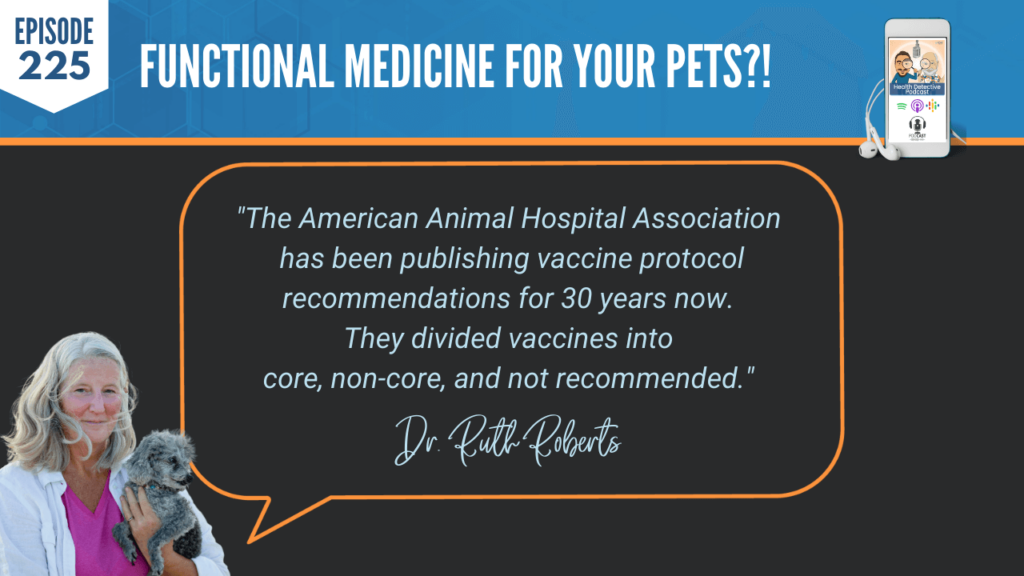
The American Animal Hospital Association has been publishing vaccine protocol recommendations for 30 years now. They divided vaccines into core, non-core, and not recommended.
Core vaccines are distemper, parvo, rabies, and the recommendation is for puppies 12 weeks, 14 weeks. If they get a vaccine for the first time then, they’re good for the puppy series because maternal antibodies have dropped at 12 weeks sufficiently to allow the puppy to create its own antibodies. Revaccinate at one year and then going forward do titers.
Non-core are things like leptospirosis, Lyme vaccine, and there’s a couple of others. Then non recommended are ones like Coronavirus, that was always a vaccine in search of a disease. And the flu vaccine is sort of in that category.
Functional Medicine for Your Pets: Think Your Way Through
With the non-core, what you have to think about is, is there Lyme where I live, and what’s the incidence map look like? And are there other tickborne diseases like anaplasmosis, Rocky Mountain Spotted Fever? If that’s the case, the Lyme vaccine is not going to protect against those, and it probably doesn’t protect it. It’s got an on again off again track record.
What’s important there is doing really good tick control because Lyme is terrible, but so are the other diseases. If you’re not protecting it against ticks, you’re inviting problems. Leptospirosis, again, you have to look at the incidence map for your area. If it’s a really high incidence, then okay, consider it knowing that according to Dr. Schultz, if the vaccine is not given at least every six months, which no veterinarian does, then your dog is not protected against Lepto.
He’s done a lot of research for almost every company. And he’s had to sort of tone that down a little bit to be able to keep doing the other good work that he’s doing.

So, think your way through. You know, are you going to take a malaria vaccine if you live in California? Probably not, because the incidence of malaria in California is probably about zero. Just think your way through. You can Google stuff. What’s the incidence of Leptospirosis in dogs in Flint, Michigan? Then you can go from there.
Rational discussion about this doesn’t happen. And unfortunately, veterinarians are now strong-arming people to get annual vaccines saying, okay, I won’t see you anymore if you don’t do this, even though the science says that’s not the correct thing to be doing.
Functional Medicine for Your Pets: Pro-Vaccine for Specific Things
[00:34:41] Detective Ev: Thank you, because I’m glad I still got the opportunity to ask that question. To me, the fact that human vaccines too, have turned into things like religion and politics, I just, I can’t understand this.
The people that go to the extreme on one end and say, no vaccines ever, they’re all bad. I say, okay, do you think some medications are useful some of the time? Every single one of them will say yes. I’m like, so why would that not work for vaccines?
Now, on the opposite end, some people will say, because if you come up with the idea that perhaps a vaccine caused any type of side effect or downside, they’d be like, no, that’s impossible; that doesn’t happen. And I asked them, does every medication have some chance of causing some side effect? And they’re like, oh yeah. I’m like, oh, but vaccines are exempt from that? So, I argue both sides with it.
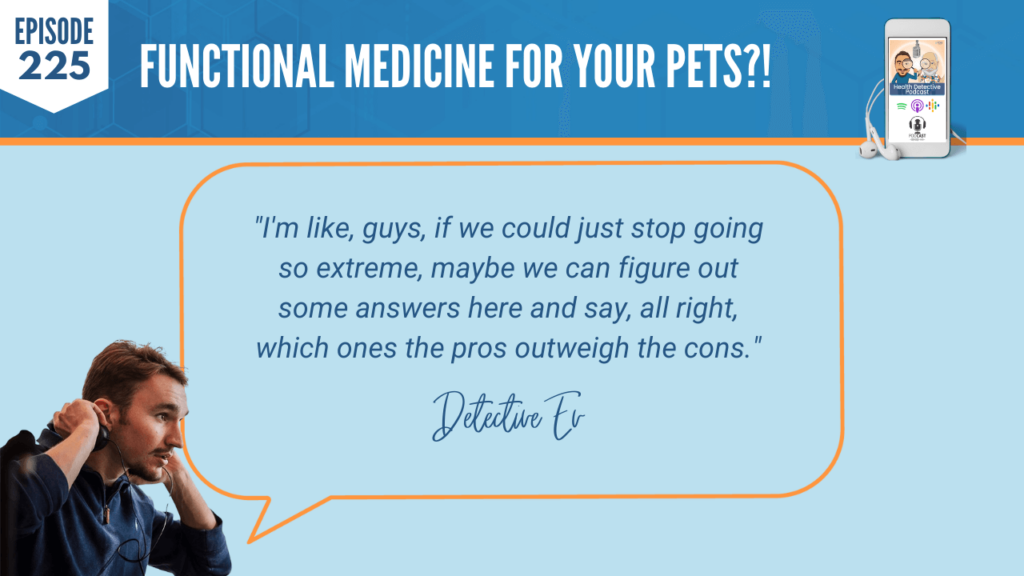
I’m like, guys, if we could just stop going so extreme, maybe we can figure out some answers here and say, all right, which ones the pros outweigh the cons. Versus which ones are like, okay, are we just doing this cause someone said that we were supposed to do it and we never really thought about it, like you said.
[00:35:33] Dr. Ruth Roberts: Because this is the standard of care, right?
That is a problem. I am not anti-vaccine; I’m pro-vaccine for specific things. Because I can tell you I have treated 30 cases of parvo every day for six weeks in the summer for years, and it’s horrible. It’s horrifying.
Where to Find Dr. Ruth Roberts
Also, I got a rabies vaccination when I was in veterinary school. I had a horrible reaction to it, but that’s an issue for me, individually. There are vaccine reactions that happen. There are ways to help support pets so that they don’t happen.
Again, it’s an individual decision and it’s also what’s actually a problem out there. So, yeah, we have to have a rational discussion and unfortunately that’s not happening.
[00:36:20] Detective Ev: Cool. Well, thank you for that.
All right, so now I want to ask, I gotta get to a client testimonial too. I’m sure there’s been some amazing things that have happened over the years. But to be clear, you offer stuff online, but can people work with you in person still? Like you’re practicing right?

[00:36:31] Dr. Ruth Roberts: No. So here’s what I’m doing actually. Yes, we’ve got a website, drruthroberts.com. We’ve got the courses available for sale there. We have supplements available for sale.
What I’m doing now is because, yes, I can work with people one to one, but that’s very slow and I’m not helping as many people as I can. What I’ve done is actually develop a certified holistic pet health coach training program. Much like the human health coaching model, this has made a massive impact in people’s health because, if you get up and move and drink more water and maybe consider cutting a few things out of your diet, you’re going to feel a boatload better and helping you take the baby steps into the big steps. This is what is going on.
Functional Medicine for Your Pets: Training & Supporting Holistic Pet Health Coaches
So, I started this program in June. I have 12 graduates now that are certified. They’re out there helping people in astonishing ways. Because I’m able to continue to support them with weekly coaching calls, if they hit a problem with a particular pet they’re working with, we can walk through it and help them solve the problem. In this way, we’re making a massive impact on pet health when people are getting stonewalled by their veterinarians.
I don’t mean to bash my profession, they’re under tremendous duress. I mean, they’re trying to see complicated medical cases in six to 12 minutes, and you cannot do the job well doing that.

So, that’s where my main focus is right now, is training and supporting holistic pet health coaches. That is the way that you can get support to start figuring out what are the lifestyle changes I need to do? What do I need to talk to my veterinarian about for my dog with kidney disease? These folks can give you the information you need to ask intelligent questions, really maximize the value of any veterinary visits you’ve got and help you figure out what the heck is going on when you get some of those lab results back.
[00:38:31] Detective Ev: Dr. Roberts, I both love and hate you. I love you for creating this. I hate you because the second my animal loving future sanctuary owning girlfriend hears this, I’m going to know when she listens. Because she’s going to call for a meeting for the couple’s budget. She’ll be like, yeah, let’s talk money really quick. And I’m normally the one to initiate it. I know when she initiates, I’m like, yeah, she heard Dr. Roberts’s podcast, all of a sudden.
Functional Medicine for Your Pets: A Discount & A Bonus
I’m not joking though. I can picture her actually doing this because her real dream is to own this whole sanctuary for animals and stuff, like a wildlife sanctuary, right? She’s got a whole vision for this.
The fact is she’s about to graduate FDN in like a week and a half after recording this. Actually, while we are speaking, she’s doing one of her final practicals for the course. That’s amazing.
What a cool thing to create. I mean, this is going to be big.
[00:39:14] Dr. Ruth Roberts: Yeah, it is, it’s going to be huge.
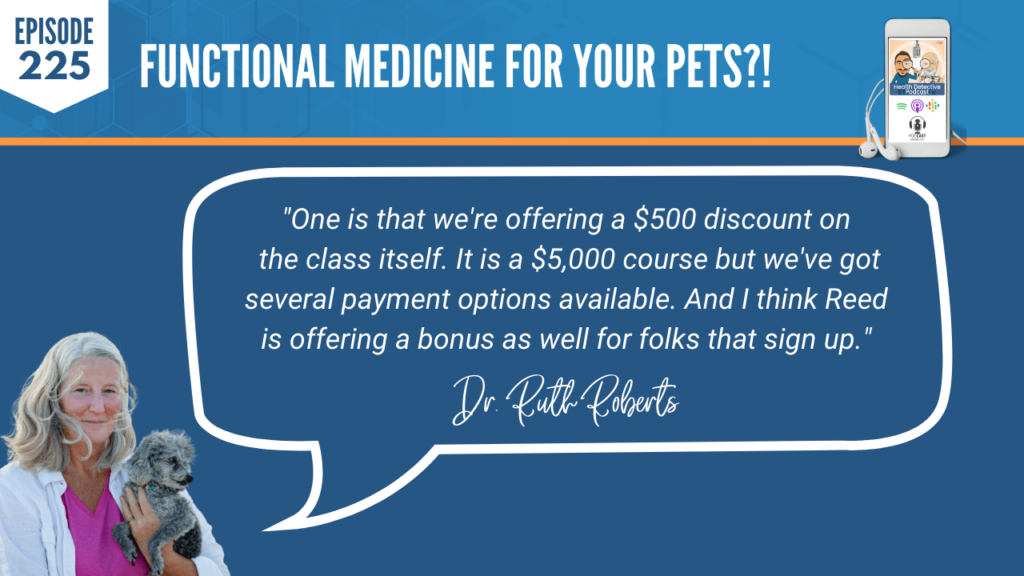
That’s the thing, for the FDN folks, we have, well, I mean there’s two things that are just amazing. One is that we’re offering a $500 discount on the class itself. It is a $5,000 course but we’ve got several payment options available. And I think Reed is offering a bonus as well for folks that sign up.
[00:39:38] Detective Ev: Yes, this makes more sense now. I believe it’s still April 30th, don’t quote me on it. It’ll be in the show notes guys. Just go to the show notes and we’ll have all the details there. But if you sign up for Dr. Robert’s course before a certain timeframe, you will actually get one of the FDN advanced courses for free.
So, you’ll have a heck of a lot of learning to do in the next year or so. But hey, that’s never really a problem for this community. I think they love doing that.
Functional Medicine for Your Pets: It Works for Everybody
This is big though, cause there’s no shortage of pets. I’d love if all these humans did this, but this might actually be more of an entryway to get humans to do FDN stuff than the other way around because they’ll do anything for their pets.

[00:40:10] Dr. Ruth Roberts: Exactly. That’s always been my secret backdoor. I lived and walked when I was talking for pets and people would see what was happening with their pets and see what was happening with me. They’re like, oh, I should do this too.
I had a guy that, he was my optometrist. I went to see him, and he said to me, you know, Ruth, I gotta thank you because through what you did, by teaching us how to cook for our dogs and cats, we realized what we were eating was hurting us. So, we made massive changes in how we eat, how we feed our children. It’s made everybody healthier.
That’s exactly it. I mean, we’re all mammals, right? It’s going to work for everybody.
[00:40:50] Detective Ev: Yeah. I had to get this question today. I always like to ask people when they’re working with humans, what’s like one of their favorite testimonials.
But now between the work you’ve done and the practitioners you’re training, I don’t care where it came from. I’m just curious like, I want to see how good this can get. Like what is one of your favorite stories? Like, I don’t know if there’s animals with diseases that get reversed, or maybe it’s just an extension of life or quality of life, but what’s your favorite one that you’ve heard so far?
Functional Medicine for Your Pets: Client Success Story
[00:41:14] Dr. Ruth Roberts: Oh man. It’s tough. I mean, there’s so many amazing things from my own patients.
But one of the best things was from one of my students who’s now graduated. He has a massage business for dogs. So, he was already working closely with dogs and especially with folks in the agility world. He got a client, and this lady had a very, very itchy dog. They tried everything, steroids, apoquel, cytopoint, all these chemicals and medications to control the symptoms.
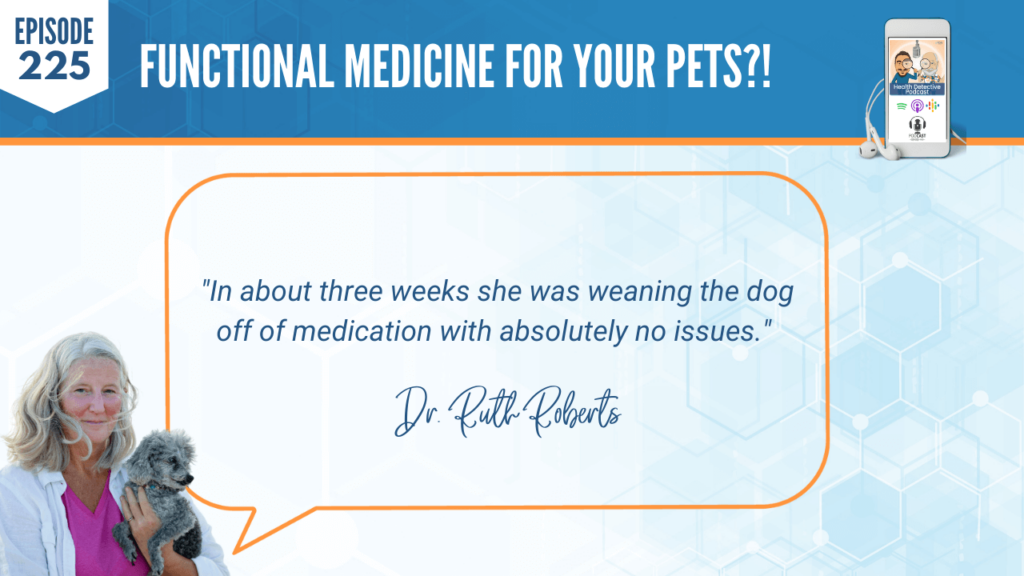
He got her to commit to cooking and adding in fairly high dose of omega-3 fatty acids, adding in some probiotics and adding in the supplement to balance the diet and provide glandular support. In about three weeks she was weaning the dog off of medication with absolutely no issues.
He’s like, oh, wow. This really, really was easy and this woman is incredibly happy because now her dog is not on all these potentially disease inducing medications.
[00:42:18] Detective Ev: Nice. Guys, they got such a short life compared to us. Not that we couldn’t argue our life short in the grand scheme of things. But the last thing we want to do is waste a year of their life. It’s a lot different than wasting a year of ours when we’re sick, right? I mean, that’s a notable fraction of what they’re doing.
You’re getting my wheels turning. I hear so much stuff on this podcast that it’s like, I’m excited for everyone, but I don’t really think about it personally.
Functional Medicine for Your Pets: Support, Education, & Business Tips
But this, you’re getting me. I’m like, all right. One of my business partners for our functional medicine studio, his original business is, like I said, he owns a dog kennel with 50 dogs. He’s super popular in the area, so I’m like, hmm. We go through Dr. Robert’s course and then we have him, and we already have qualified the clients cause they’re paying like $4,000 to do these board and train programs with him. So, they have money for this kind of stuff. I’m like, All right. We might have something here, my friend.
And it seems easier to work with dogs than humans sometimes.
[00:43:07] Dr. Ruth Roberts: It is. And that’s all good stuff.
That’s the thing, Evan, is that in this program, yes, you get the coaching calls with me, so you get support during and after. But you also get a mentor to work with one-to-one. So, if you’re hitting like, oh my God, traditional Chinese veterinary medicine is freaking me out and I’m really struggling with it, you have somebody to talk to, to help walk you through that, start to understand it a little bit better. We’ve got such an amazing community of people. They’re all supportive of each other.

That’s the other big thing, is part of what I teach, is how to promote yourself so that you can actually make this a business and support yourself, your family, and do what you love at the same time.
[00:43:49] Detective Ev: Very cool. Is there any other place that people can follow you? I don’t know if you use Instagram, Facebook, or whatever, but is there any place people can follow you or check out your stuff?
Dr. Roberts’s Social Media & The Signature Podcast Question
[00:43:56] Dr. Ruth Roberts: All that stuff: Instagram, Facebook, we have a really huge YouTube channel. We’ve got some stuff going on TikTok. Yeah. So just look for drruthroberts. You’ll be able to find me kind of anywhere.
[00:44:10] Detective Ev: Awesome. I’ll have that down below for you guys. Now this is interesting cause we usually finish with my signature question and so you can answer it any way you want. We might have already talked about this in the pet sense. So again, you interpret it the way you want.
But normally what we ask is, if in this case, I could give Dr. Roberts a magic wand and you could wave it and get every single person in this world, or dog, to do one thing for their health or get them to stop doing one thing, what is the one thing that you would get them to do?
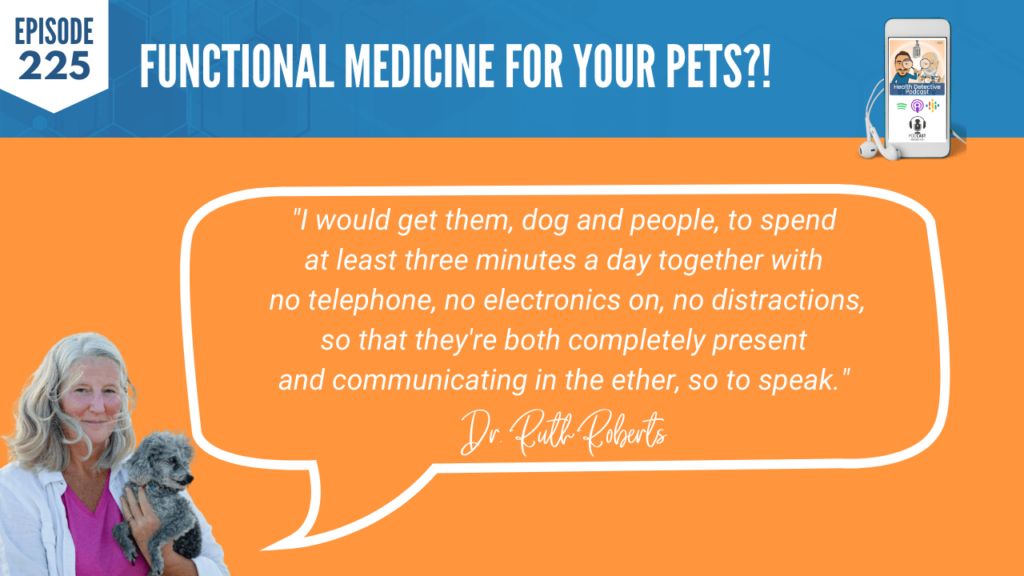
[00:44:41] Dr. Ruth Roberts: I would get them, dog and people, to spend at least three minutes a day together with no telephone, no electronics on, no distractions, so that they’re both completely present and communicating in the ether, so to speak. It’s super clear that mindfulness is essential for us in this crazy world to stop and get some white space.
It’s also critical for our pets. Because if we’re running around cranked up and wired and fired all the time, they’re receiving that energy of anxiety. And if we will take the time to just let it go, calm down, sit back inside of ourselves and be present with them, that makes an enormous difference.
[00:45:31] Detective Ev: Excellent. Thank you so much for hopping on with us today.
[00:45:34] Dr. Ruth Roberts: With pleasure.
Conclusion
Thank you for spending time with us today. You can always visit us at functionaldiagnosticnutrition.com.
For more informative podcasts like this one, go to functionaldiagnosticnutrition.com/health-detective-podcast/.
To learn more about us, go to functionaldiagnosticnutrition.com/about-fdn-functional-testing/.

